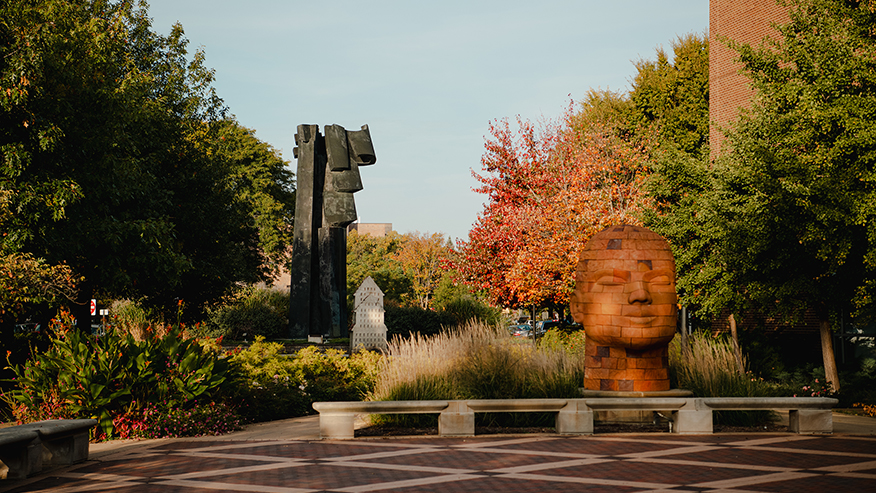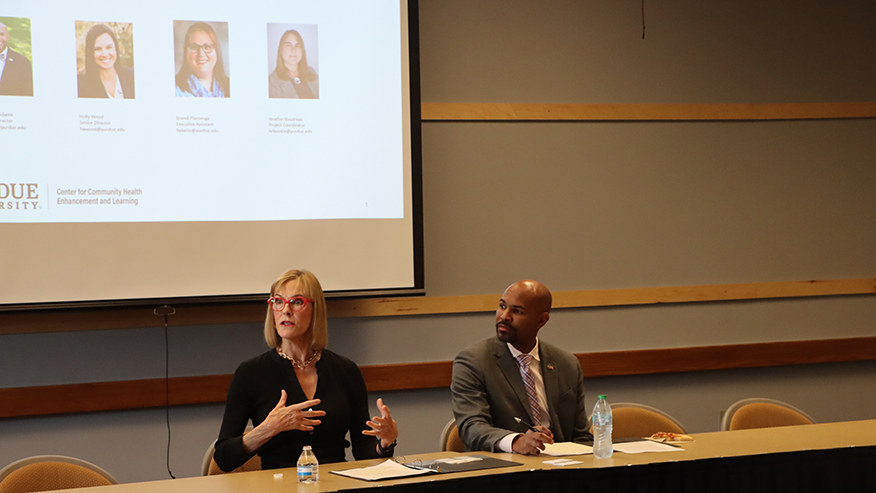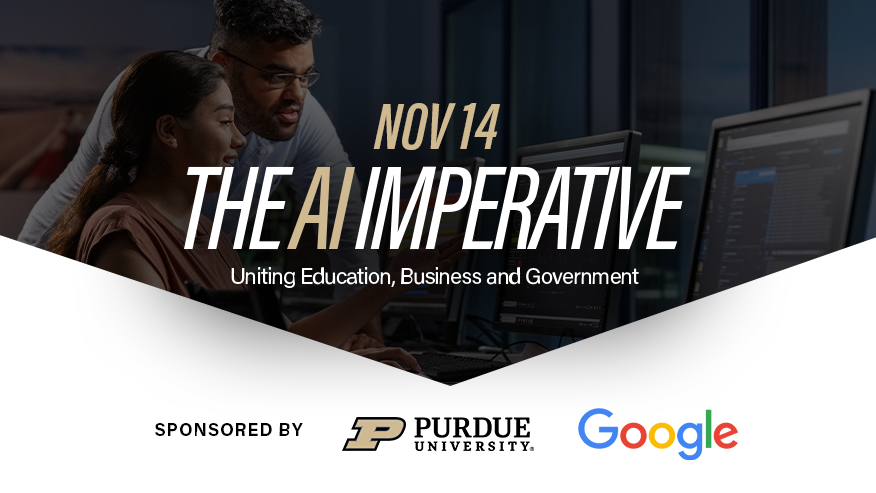Purdue ranks 4th in U.S. for U.S. patents received in 2023
Turning knowledge into impact, Purdue University researchers rank 4th among U.S. universities — 5th in the world — in U.S. patents received in 2023, with 201 patents

WEST LAFAYETTE, Ind. — “We hope that if curious minds come together, then together we might be able to tackle some of the world’s most troubling diseases,” says Herman Sintim, the Richard B. Wetherill Distinguished Professor in Purdue University’s Department of Chemistry. While Sintim is laser-focused on using his research to target serious diseases that have no effective treatments, the ethos of brilliant minds coming together to solve major problems is a constant through line in Purdue’s DNA.
Take Jian Jin’s LeafSpec (or his “magic wand,” as he calls it), a hand-held hyperspectral leaf scanner that can easily diagnose plants for all kinds of different stresses with just a wave of the machine and a five- to eight-second wait. Or Nien-Hwa Wang’s innovative technologies to separate and purify rare earth and battery elements using significantly less power and water and fewer hazardous chemicals while generating near-zero waste.
No matter their area of expertise, Purdue researchers persistently pursue solutions to real-world problems, changing lives every day with innovation and commercialization. A complement to the Top 100 U.S. Universities Granted U.S. Utility Patents report, published June 4, turns Purdue researchers’ daily pursuit of innovation into measurable success. Purdue received 201 patents from the U.S. Patent and Trademark Office during the 2023 calendar year. The University of California system, MIT, the University of Texas system and Stanford also ranked in the top five. Purdue is the only Big Ten university ranked in the top 10.
“Purdue University faculty continue to pursue discovery across many disciplines at the highest level, reflected in our ranking as the fourth American university in U.S. patents received. As a public land-grant institution, we are proud to support inventors and entrepreneurs in translating research to societal impact,” Purdue President Mung Chiang said. “Through programs such as Purdue Innovates, we are able to foster a culture of discovery, license their world-changing technologies to market and protect their intellectual property rights as needed.”
Purdue Innovates is the engine behind world-changing innovation, serving as Purdue’s front door to commercialization. The Purdue Innovates Office of Technology Commercialization manages the technology transfer process to vet, protect and license innovations developed by university researchers, including the filing of patent applications. Its technology portfolio covers innovations in subject areas including agriculture, biotechnology, chemistry and chemical analysis, computer technology, engineering, food and nutrition, green technology, micro- and nanotechnologies, and more.
Among the 2023 patents were:
- “Magneto Safety Guard” by Jonathon Ziulkowski, Purdue Polytechnic Institute
- “Preparation of Rare Earth Metals and Other Chemicals from Industrial Waste Coal Ash” by Nien-Hwa Wang, College of Engineering
- “Portable Plant Health Analysis System and Method” by Jian Jin, College of Agriculture and College of Engineering
- “Hybrid Expansive Frequency Compression for Enhancing Speech Perception by Individuals with High-Frequency Hearing” by Joshua Alexander, College of Health and Human Sciences
- “Cell-Collagen-Silica Composites and Methods of Making and Using the Same” by Jenna Rickus, College of Engineering, Office of the Provost
- “Inhibitor of Kinase Networks and Uses Thereof” by Herman Sintim, College of Science
About Purdue University
Purdue University is a public research institution demonstrating excellence at scale. Ranked among top 10 public universities and with two colleges in the top four in the United States, Purdue discovers and disseminates knowledge with a quality and at a scale second to none. More than 105,000 students study at Purdue across modalities and locations, including nearly 50,000 in person on the West Lafayette campus. Committed to affordability and accessibility, Purdue’s main campus has frozen tuition 13 years in a row. See how Purdue never stops in the persistent pursuit of the next giant leap — including its first comprehensive urban campus in Indianapolis, the Mitchell E. Daniels, Jr. School of Business, Purdue Computes and the One Health initiative — at https://www.purdue.edu/president/strategic-initiatives.
About Purdue Innovates
Purdue Innovates is a unified network at Purdue Research Foundation to assist Purdue faculty, staff, students and alumni in either IP commercialization or startup creation. As a conduit to technology commercialization, intellectual property protection and licensing, startup creation and venture capital, Purdue Innovates serves as the front door to translate new ideas into world-changing impact.
For more information on licensing a Purdue innovation, contact the Office of Technology Commercialization at otcip@prf.org. For more information about involvement and investment opportunities in startups based on a Purdue innovation, contact Purdue Innovates at purdueinnovates@prf.org.
About the Top 100 U.S. Universities Granted Utility Patents in 2023
The information provided in this list is based on data obtained from the U.S. Patent and Trademark Office. For this report, a university is defined as an institution that has undergraduate degrees. Patents include only utility patents granted during the 2023 calendar year. All assignees are credited for patents when listed. The number of patents granted does not necessarily indicate the value of a university’s technology, the effectiveness of its research, or whether its patents will be successfully licensed and/or brought to market. This is a dynamic list of worldwide institution patents. Some universities may record patents under different, yet similar names or combine their patents under one foundation or trustee name. If you have questions, please contact: info@academyofinventors.org.
Media contact: Polly Barks, phbarks@prf.org
Sources: Mung Chiang, Herman Sintim



